- Home
- Nancy Mehl
Simple Secrets (The Harmony Series 1) Page 8
Simple Secrets (The Harmony Series 1) Read online
Page 8
“Well, Sarah is very talented. A real artist.” I picked up a package of the green leaf stationery, along with some matching envelopes. “I’d love to learn more about this process.”
“Gabriel won’t let you anywhere near his daughter,” Sam said. “In fact, when Ruth sells her work, she has to give the money to him. He won’t allow the proceeds to go directly to Sarah.”
“He sounds like an awful person. Why doesn’t Sarah just leave?”
Sam shook his head. “She’s afraid of him, Grace.”
“I’m not so sure she isn’t more afraid for him,” Ruth said frowning. “Gabriel used to be a different person before his wife ran off with another man. He always had a good word for everyone. I liked him. But after his wife left, he completely changed. I think Sarah feels responsible for him—as if it’s her job to look after him.”
Anger churned inside me. “I’m sorry for him, but what about her life? She must be extremely unhappy.”
“I don’t believe he realizes what he’s doing to her,” Sam said. “He thinks he’s protecting her against the world. The same outside world that stole his wife. Of course, Angstadt’s early influence in his life has only reinforced his suspicion and fear. One of the bishop’s main teachings was that worldly influences cause nothing but spiritual pollution. I guess in his mind, that justifies his treatment of Sarah.”
“That preacher left a trail of confusion behind him, that’s for sure,” Ruth said, shaking her head. “Thank God Abel Mueller came to this town. The difference is night and day.”
“If you’ve spent enough money, we should get going,” Sam said. “I didn’t think we’d be spending our whole day here.”
“Now you let Gracie alone, Sam Goodrich,” Ruth said goodnaturedly. “She can buy anything she wants.”
I took the stationery up to the counter and put it with the painting, the pillowcases, and the fudge. “I’d really better get out of here. I won’t have any money left.”
“Well, before you leave, I have to show you my pride and joy.” Ruth’s eyes sparkled as she directed my attention to something silver inside the glass case under the counter.
Sam grinned. “She shows off her pride and joy to everyone who steps foot in this place.”
“Now, Sam Goodrich,” Ruth shot back, “you just hush.”
“Oh my goodness. What is it?”
Ruth smiled. “This is the one thing I won’t sell. I let it stay in the store so folks can enjoy it. You see, I live alone. Keeping it in my house just for my tired old eyes doesn’t make much sense.”
She slid the door behind the case open and lifted out a silver piece that looked like a vase with handles and a top. Under the silver cover decorated with floral finials sat a glass container. The silver itself had been beautifully decorated with rosettes and laurel leaves. Leaves ringed a square-shaped stand, and on the front, a silver flower encircled a crest.
“I’ve never seen anything like it,” I said. “It’s beautiful.”
“Believe it or not, it’s a chestnut vase.” Seeing the surprise on my face, she beamed. “That’s what it was designed for, but near as I can tell, my ancestors actually kept sugar in it.” She touched it lovingly. “It was handcrafted in the 1700s by a rather well-known designer and given to one of my relatives as a gift. It’s been handed down for generations. When I’m gone, it will go to my daughter. It’s very valuable.”
“Does your daughter live here?”
“No, she lives in Kansas City with her husband. But she visits when she can. Next time she comes, I’ll introduce you.”
“I would like that, but I’m only going to be here a couple of weeks.”
Ruth’s forehead wrinkled. “That’s right. I forgot. For some reason it seems as if you’re already a part of us.” She carefully put the vase back behind the counter. “Well, it’s too bad. Carolyn would have loved you.”
She rang up my purchases on a cash register that looked about twenty years old. My total was a lot smaller than it would have been for the same items in Wichita.
“Why don’t you leave this stuff here and come back for it later, when you’re finished looking around town?” Ruth said. “That way you won’t have to lug it around or let your fudge melt inside Sam’s truck. It doesn’t seem hot outside, but you know how steamy the inside of a vehicle can get when the sun beats down on it.”
“Thanks. I will.”
Sam stood at the front door, holding it open. “Come on, woman,” he said with a grin. “We’ve only made a little dent in our tour.”
“He’s getting a little pushy, don’t you think?” I said to Ruth, who laughed and waved good-bye.
Back out on the sidewalk, Sam guided me to the next store. Harmony Hardware was exactly what the sign declared. A small hardware store with items you would find in most other shops just like it. However, among the hammers, nails, and other tools, there were handmade wooden spoons and oil lamps. Obviously it was geared to accommodate all of Harmony’s citizens. I recognized the outside of the building as the place where Amil Angstadt’s had had his picture snapped unawares so many years ago.
Sam introduced me to Joe Loudermilk, a small man with a ready smile and an offer of hot coffee.
“Joe’s got the pot going all day,” Sam said. “Don’t you, Joe?”
“You bet.” He lowered his voice and gave me a secretive smile. “Get ’em in for coffee, and they’re buyin’ stuff they forgot they needed. Works every time.”
“Well, I don’t want coffee, but I need some things to help Grace live a little better out there at Ben’s house.” Sam said. “Why don’t you give me a good flashlight—and a couple of those battery-powered lamps?” He turned to me. “These will give you a lot more light than those old oil lamps.”
“Great idea, but what if I hear another monster clumping around outside?”
“I have a plan that should keep you safe from monsters. We’ll have to stop by my place on the way home, though.”
I was thrilled to know I was going to get to see the inside of his house, yet disturbed that he called my uncle’s house home. It certainly wasn’t my home.
Sam paid for the lamps and flashlight even though I offered. His argument that he could use them after I left took the wind out of my protests, and I finally agreed.
We visited two more stores on that side of the street: a secondhand store that had lots of great items, and a clothing store that carried some of the traditional garb worn by many of Harmony’s populace. The proprietors at Cora’s Simple Clothing Shoppe were friendly and welcoming, even though my basic questions and ignorance about their practices made it obvious I wasn’t Mennonite. They showed me different garments and explained that originally, wearing certain kinds and colors of clothing was an attempt by the Mennonites to show their separation from the rest of the world. But eventually it was determined that although keeping oneself removed from carnality was a positive thing, removing themselves too far from the people Christ called them to love wasn’t productive. They showed me dresses in lovely fabrics and styles, along with many skirts and blouses that, although plain, were no different than clothing being sold in regular stores across the country.
“Dressing modestly is our aim,” Cora Crandall, the store owner, said. “Quite a few of the women love the traditional prayer coverings while some wear nothing on their heads at all—except in church.” Her white cap and peach-colored dress accented her dark skin and large brown eyes. Her husband, Amos Crandall, towered over her and exuded friendliness. I immediately liked this couple.
“Many people believe that the scriptural admonition of a head covering in church isn’t relevant for today,” Amos said. “Others feel it is. So each person wears what they feel comfortable with. There are no rules set in stone.”
I thanked them for their insight. I came incredibly close to buying a lovely apple green dress with small flowers, three-quarter-length sleeves, and a gathered waist. The lace around the collar was light and delicate. Unfortunately, I coul
dn’t think of a single place to wear it. I held it for several minutes before reluctantly putting it back on the rack.
Sam and I spent the rest of the morning visiting the other side of Main Street. I met the owners of the leather and feed store. Paul and Carol Bruner carried everything needed for horses and cattle. Dale Scheidler ran the farm implements store with his brother Dan.
Then we got to Nature’s Bounty, a small shop that sold dairy products, fruits, and vegetables.
“I sell a lot of my fruit here,” Sam said. “Although most of it is marketed in Council Grove and Topeka.”
The store was rather crowded with people buying milk, cheese, and fruit. Sam pulled me aside. “That’s Joyce Bechtold,” he whispered. “She’s the woman who painted the birds on Ben’s houses and feeders. We should come back when she’s not so busy. I know she wants to meet you.”
Joyce was a lovely woman with curly hair the color of molasses, cut to just above her shoulders. She had soft brown eyes and laugh wrinkles. I whispered to Sam, “Is she Mennonite?”
“No, as a matter of fact, she’s not. She attends my church.”
I wondered if that had anything to do with my uncle’s lack of interest in her. Too bad. Even from across the room, her graciousness and kind attitude toward others was obvious. As she finished helping a customer, her eyes swung over to where Sam and I stood. When she saw me, her eyes widened and her complexion grew pale. I saw Sam nod slightly to her.
“Let’s get going,” he said gently.
When we were outside, I grabbed his arm. “Joyce seemed shocked when she saw me. Why?”
Sam sighed. “She knew you were coming, but none of us knew how much you looked like Ben. It’s rather startling.”
“You didn’t seem surprised when you first met me.”
He blushed. “Guess I was just thinking about how pretty you are.”
I stared at him, but I couldn’t come up with a snappy comeback. All I could think about was that he’d said I was pretty. I tried to change the subject quickly. “I—I get the feeling Joyce really cared for my uncle.”
“Yes,” he said quietly. “She really did.”
Next to Nature’s Bounty was Keystone Meats. I started to open the door when Sam caught me by the arm.
“We don’t really need to go inside. John Keystone...”
“Don’t be silly,” I said lightheartedly. “We’ve made the rounds of all the other stores. I want to check out this one, too.”
I swung open the old screen door on the whitewashed building with the bright red–painted letters and stepped inside. Unlike Joyce’s store, there weren’t any customers standing around. In fact, Sam and I were the only ones. My first impression was that there wasn’t anyone at all in the store. Then a man came from behind the meat counter. He was tall and slender, probably in his early thirties. His long, aquiline nose and dark eyes enhanced his wellsculpted good looks and tanned skin. Longish black hair only added to his overall attractiveness. I felt my mouth go a little dry.
“Hello, Sam,” he said in rich, deep tones. “What do you want here?”
“John,” Sam said, acknowledging the man with a nod. “This is Grace Temple, Benjamin Temple’s niece.”
“Hello,” I said slowly. The tension between the two men was palpable. What was this about?
John wiped his hands on the white apron he wore over jeans and a dark blue shirt. He stuck out his right hand, and I took it. He held it a little longer than was necessary, but I didn’t pull it away. His eyes locked on mine and for a moment I felt transfixed. A door slammed behind us, breaking the moment.
“Well, here you two are. I was beginning to wonder if you’d left town.” Mary sashayed up next to us, a fake smile plastered on her pretty face. Before Sam or I had a chance to respond, she turned her full attention to John.
“I need some ground chuck and twelve rib eyes for tonight, good lookin.’ Is that possible?”
He spread his arms apart. “Anything for you, gorgeous.” He whirled around and disappeared through a door behind his counters.
“So, Gracie. Have you met everyone in town yet?”
“Of course she hasn’t, Mary,” Sam said in measured tones. “There are almost five hundred people living in Harmony. We couldn’t possibly meet all of them in a couple of hours.”
Mary’s right eyebrow shot up. “Oh, has it only been two hours? Seems like much longer.”
Frankly, I was getting tired of Mary’s jealous digs. “Maybe we should go, Sam. I’d like to take a nap sometime today. I didn’t sleep well last night.”
“Sure. No problem.” He walked to the door and pushed it open, waiting for me to exit first. The door slammed loudly behind us.
“Look, Sam,” I said when we were a few feet away. “I don’t want to be a source of contention between you and Mary. Maybe it would be better if we ... well, if you and I didn’t see each other again.”
“No!” His explosive response startled me. He blew a deep breath out between clenched teeth. “I ... I should explain, I guess.” He pointed toward a bench in front of the meat market. “Let’s sit down a minute.”
I lowered myself down on the bench and waited. After a little pacing, he finally sat down next to me.
“Mary and I ... I mean ... We’re kind of engaged.”
My mouth dropped open in surprise. “Kind of engaged? How can anyone be kind of engaged? Either you’re engaged or you’re not.”
He hung his head and stared at the ground. “I don’t know how it happened. To this day, I swear I don’t remember asking her to marry me. But somehow she got the idea that I did. Now I don’t know how to get out of it. I—I don’t want to hurt her.”
I let out an exasperated sigh. “You can’t marry someone because you don’t want to hurt her feelings. That’s ridiculous.”
“I know, I know. I’ve been trying to fix this thing for months. But every time I even begin to bring up the subject, she starts crying and I back off.”
I put my hand on his arm. “The longer you string her along, the worse it will be. You’ve got to tell her. Let her get on with her life.”
“I know. I know you’re right.” He put his hand over mine and looked into my eyes. “Thanks.”
“You’re welcome.” I pulled my hand away, my own words ringing in my ears. In two weeks I would be gone. It wasn’t fair to either one of us for me to allow feelings to build up between us. Of course, maybe Sam wasn’t interested in me at all, but when I looked in his eyes, I could almost swear I saw something stirring there.
I decided to change the subject. “You and John Keystone don’t get along very well. Is there a problem?”
He shrugged. “Keystone’s only been in Harmony a little over a year. He came here with an attitude. I’m not the only one he doesn’t like. No one’s been able to forge a friendship with the guy—except Mary.”
It seemed odd that someone with no roots in Harmony would move here and start a business, but John Keystone wasn’t my problem. I had other fish to fry. I pointed to the last shop on the street. Hoffman Candles. Now there was something I could get into. “I love candles. Let’s finish our tour—and then to the bakery.”
Sam nodded and stood up. He swept one hand toward the candle shop and bowed slightly. Then he followed me to the white clapboard building with large windows and dark blue shutters. He ushered me into a room that contained a hodgepodge of aromas. Shelves with different kinds and sizes of candles shared space with interesting holders made of wood and metal. Some were freestanding while others were made to mount on the wall. I’d never seen so many different types of candleholders before and mentioned it to Sam.
“Levi Hoffman makes the candles, but the holders are created by Harmony residents,” he said. He pointed to a set of burnished metal holders. “These were built by Cora and Amos’s son, Drew.”
“Wow. They’re very good. He’s very skilled.”
“Yes, he is.”
I heard something in his voice that made me look up at
him. Sam smiled. “Drew has Down syndrome. Cora and Amos have done an outstanding job with him. They don’t treat him as if he has a disability. He’s a great kid, and he’s achieved so much more than most people expected.”
I nodded but didn’t say anything. Grant, my boss, had a son with Down syndrome. I’d watched his struggles with Jared and felt great compassion for the Crandalls.
“Who’s that out there?” A voice rang out, breaking the silence.
“Levi, it’s Sam. I’ve brought Ben’s niece to meet you.”
A curtain hanging in the back of the store parted, and a man stepped out. He couldn’t have been much older than my father, but his hair was almost completely white. With his bushy beard and chubby body, he looked like a real-life Santa Claus. His eyes twinkled, and he broke out into a big smile when he saw us. Although he had certainly changed since the picture in the café, I could still see traces of the handsome young boy in his face.

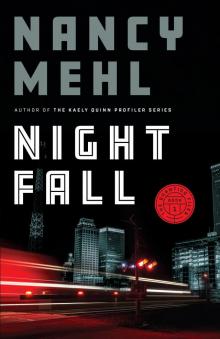 Night Fall
Night Fall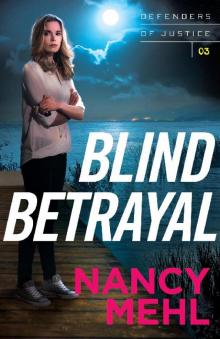 Blind Betrayal
Blind Betrayal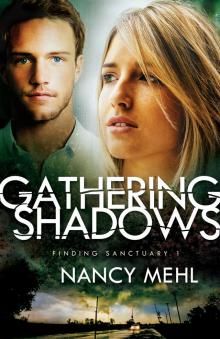 Gathering Shadows
Gathering Shadows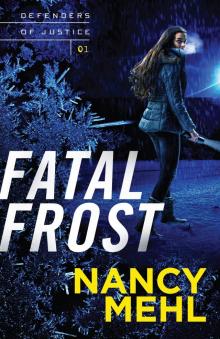 Fatal Frost
Fatal Frost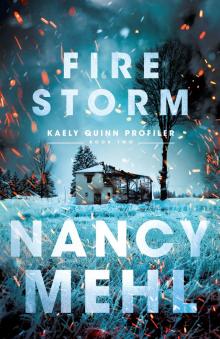 Fire Storm
Fire Storm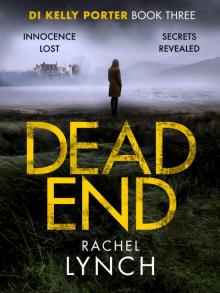 Dead End
Dead End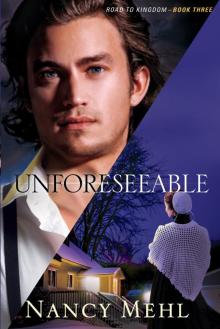 Unforeseeable
Unforeseeable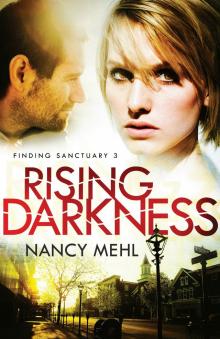 Rising Darkness
Rising Darkness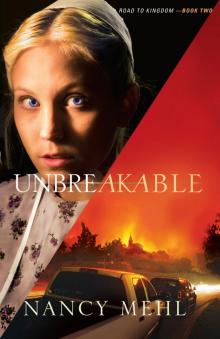 Unbreakable
Unbreakable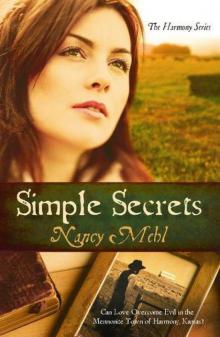 Simple Secrets (The Harmony Series 1)
Simple Secrets (The Harmony Series 1)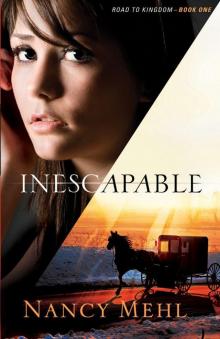 Inescapable
Inescapable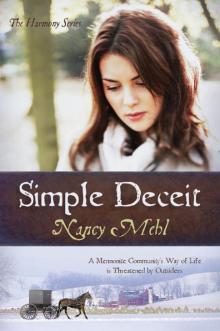 Simple Deceit (The Harmony Series 2)
Simple Deceit (The Harmony Series 2)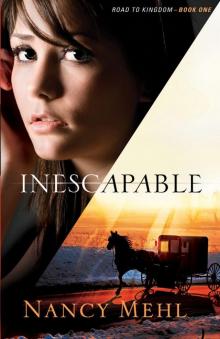 Inescapable (Road to Kingdom Book #1)
Inescapable (Road to Kingdom Book #1)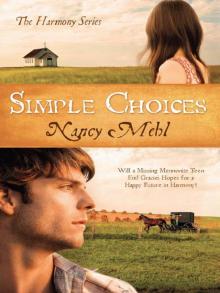 Simple Choices
Simple Choices